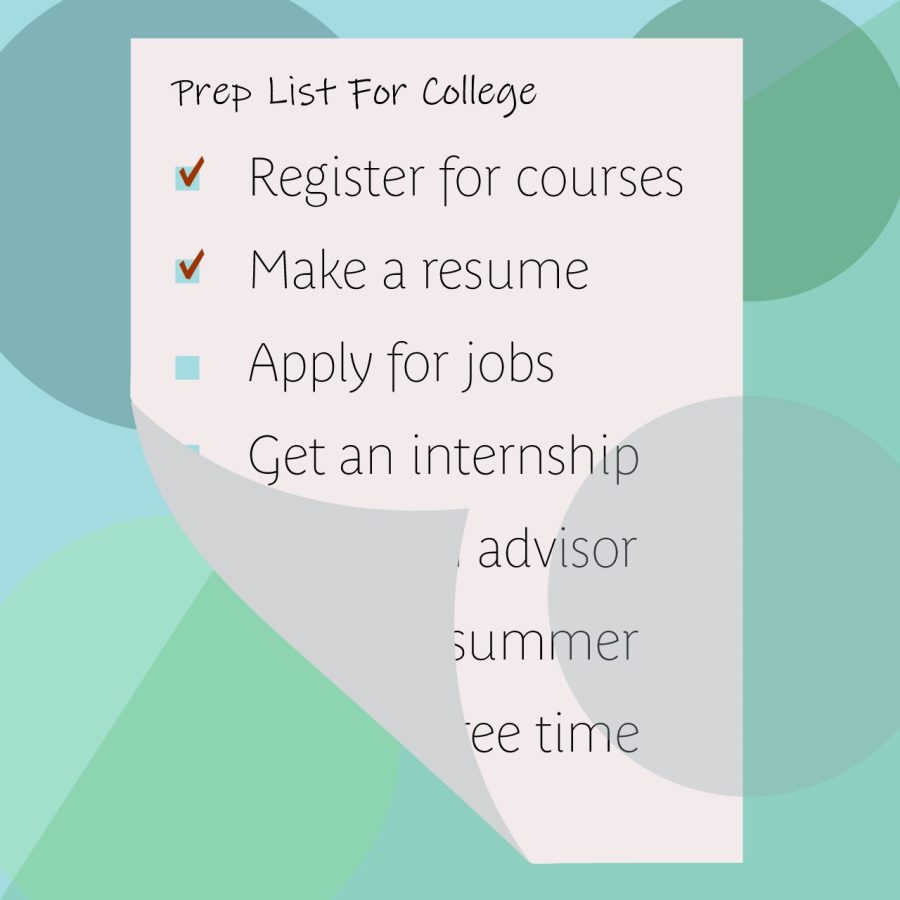Editorial — How to prepare for the later years of college
January 26, 2023
After a long and relaxing winter break, returning to campus for a new semester may have felt like a fever dream for some students. Reverting to a hyper-scheduled week filled with classes, extracurriculars and study sessions can be a bit overwhelming — not to mention the added pressure of advancing in your academic and professional careers.
To underclassmen, internships, job interviews and resume building may seem like distant concerns. However, the early years of your undergraduate studies are the perfect time to start preparing for the inevitable and, albeit scary upperclassmen years that are right around the corner.
If you are looking to preemptively eliminate some of the stresses you may face in the later years of college, we recommend taking 16 credits worth of 100-200 level classes during your freshman and sophomore years. These credits can be general education requirements or the base requirements for your chosen major — whatever works best for you.
By doing this, you are potentially lightening your future course load, which will likely consist of 300-400 level classes. Instead of taking 16 credits a semester, you can opt to take only 12 credits while trying to navigate these courses that require much more effort than those of a lower level.
But, if you need 16 credits a semester to graduate on time, consider taking some one-credit courses to fill the gaps. Some popular options include yoga, scuba diving and ice climbing.
Outside of academics, the best way to set yourself up for success as an underclassman is to get involved. The most popular way to do this is by joining a student organization, and our university has nearly 300 to choose from. In addition to taking a mental break from schoolwork, you are also creating valuable connections that will prove beneficial in your later years at NMU.
If student organizations are not your thing, there are still several networking opportunities on campus for you. Many departments host events throughout the semester that are both engaging and expand on content that is taught during lectures. These events are not only educational but demonstrate your commitment to your degree, your professors and the university itself.
Financial aid, or lack thereof, can be a big stressor for us as students. There are, however, several opportunities to help alleviate some of the financial burdens that accompany obtaining a college degree. NMU’s Donor-Funded Scholarship application opened on Monday and will close on February 20. There are nearly 500 scholarships available this application period, and we recommend that you apply for as many scholarships as you can.
Even if you only match one of the criteria for the scholarship, apply anyways. The worst that could happen is not being selected, but you will not know unless you try. And if that ultimately does not work out, additional financial aid resources can be found on the Financial Aid Office’s website.
If you are a junior or senior who feels completely in the dark when it comes to your future, welcome to the club! Despite the collective frenzy regarding what the next 10 years may hold, there are ways to better prepare yourself as a student for the challenging, yet rewarding, obstacles you will soon face.
It can be overwhelming to hear classmates discuss their internship experiences or job interviews when you have encountered nothing of the sort. It may feel as if you are falling behind or inferior to those with who you are supposed to be on the same track.
First, take a deep breath. Upon entering the later years of college, you may find yourself subconsciously competing with your peers. Remember that one person’s success is not your failure. Once you stop comparing yourself to others and realize you are on a unique academic path that is personally yours, you will be successful.
Now, if you are interested in internships, job opportunities, interview preparation and resume building, NMU Career Services offer a plethora of resources to students. By scheduling a meeting through Handshake or simply dropping by their office in Hedgcock, they will likely be able to answer all of your questions. And if they cannot, they will certainly point you in the right direction.
The key to a successful college experience, however, is being able to create a school-life balance. Prioritizing personal health and mental well-being should always come before academics. Once that has been acquired, prioritizing activities that promote happiness — in whatever way it presents itself to you — is critical to your success as an individual.
Put you first, and your degree second.
Editor’s Note: The North Wind is committed to offering a free and open public forum of ideas, publishing a wide range of viewpoints to accurately represent the NMU student body. This is an editorial, written by the North Wind Editorial Board in its entirety. It reflects the majority views of the individuals who make up the editorial staff of the North Wind. It is the policy of the Editorial Board not to endorse candidates for any political office, in order to avoid aligning this public forum with particular political organizations.


























